|
||||||||||
| Home Nation World Business Opinion Lifestyle ChinAfrica Multimedia Columnists Documents Special Reports |
|
||||||||||
| Home Nation World Business Opinion Lifestyle ChinAfrica Multimedia Columnists Documents Special Reports |
| Current Cover Story |
| Tightening Youth Ties |
| The youth are playing a vital role in enhancing China-Africa friendship and expanding cooperation |
| By Xia Yuanyuan 丨VOL. 14 August 2022 ·2022-07-25 |
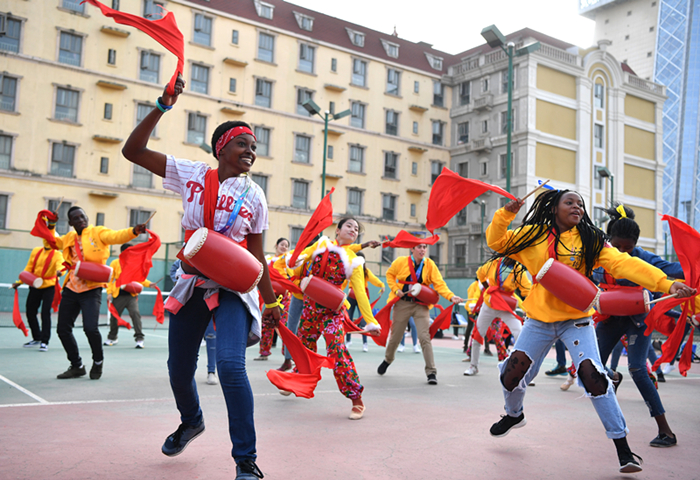
African students perform waist drum dance at Sias University in Zhengzhou, central China’s Henan Province, on October 28, 2019
Nawanda Yahya, a member of Tanzania’s ruling party Chama Cha Mapinduzi and a commissioner in Tabora District, was surprised that he and other attendees of the Former Liberation Movements of Southern Africa Leading Cadres Workshop 2022 could receive a reply from Chinese President Xi Jinping, who is also General Secretary of the Central Committee of the Communist Party of China (CPC), within a week after they sent a letter to Xi.
“We are very pleased to learn that the general secretary of the CPC Central Committee has responded to us in less than a week,” Yahya said in a phone interview with Xinhua News Agency. “Receiving a response in less than a week from such a busy leader shows how humble he is and how he acts quickly on people’s concerns.”
In June, at the end of the two-week workshop held at the Mwalimu Julius Nyerere Leadership School located in Kibaha District of Pwani Region of Tanzania, 120 participants aged between 22 and 45 from Tanzania, South Africa, Mozambique, Angola, Namibia and Zimbabwe wrote a letter to Xi, who had sent a congratulatory letter for the inauguration of the school earlier in February.
The leadership school was co-founded by six parties in Southern Africa, which serves as an important platform for the parties to enhance their capacity to govern and lead their respective countries to achieve development and benefit their people.
Noting that youth are always accompanied by dreams, Xi said in the letter that he hopes the participants make the best of what they have learned, keep working hard and embrace their youthful ambitions on the journey to realize the dream of national rejuvenation and African rejuvenation.
Xi said he hopes that the participants voluntarily shoulder the responsibility and mission entrusted to them by this era, take an active part in the cause of the China-Africa friendship, carry forward and pass on the spirit of China-Africa friendship and cooperation, and contribute to the building of a high-quality China-Africa community with a shared future.
Young people are the participants, witnesses, contributors and beneficiaries of China-Africa cooperation and are widely seen as the inheritors and new driving forces of China-Africa relations. Scholars believe that contact between young people has always been the most vibrant part of China-Africa friendship and exchanges. Since the launch of the Forum on China-Africa Cooperation (FOCAC), China and African countries have been committed to building a new strategic partnership characterized by political equality and mutual trust, win-win economic cooperation and cultural exchanges and mutual learning, and achieved obvious results. Exchanges between Chinese and African youth have continuously broadened and deepened.
Platforms for communication
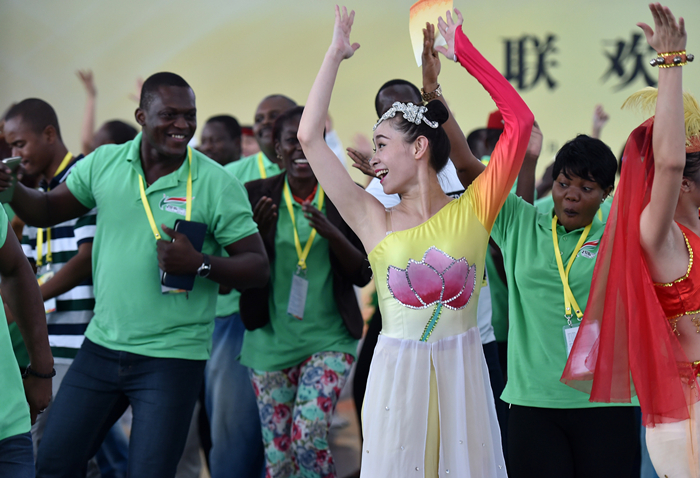
A Chinese girl dances during the 2016 China-Africa Youth Festival in Guangzhou, south China’s Guangdong Province, on August 4, 2016
Since China established diplomatic relations with African countries starting the 1950s, the two sides have institutionalized numerous platforms for exchanges between Chinese and African youth.
At the FOCAC Beijing Summit in 2006, the Chinese Government decided to send 300 youth volunteers to Africa to help in the fields of medical care, agriculture, sports, arts and Chinese language teaching over the following three years.
During his visit to Africa in early 2007, then Chinese President Hu Jintao announced a plan to invite 500 young Africans to China in the following three years. The plan was fully implemented by the All-China Youth Federation from 2007 to 2009.
Since 2011, the two sides have held five China-Africa Young Leaders Forums, and four Asian-African Youth Festivals. Six China-Africa Youth Festivals have been held since 2012. The First China-Africa Future Leaders Dialogue was held in 2021. As of 2020, the Chinese Government has dispatched 484 young volunteers to 16 African countries.
Expanding cooperation in education and human resources is an important part of China-Africa youth exchanges. China vigorously supports education in Africa. Based on the needs of African countries for economic and social development, it helps train much-needed professionals for African countries and encourages outstanding young people from Africa to study in China through a number of scholarship programs.
After the establishment of FOCAC in 2000, the number of African students coming to China began to grow rapidly. According to data from China’s Ministry of Education, as of 2018, the number of African students in China has exceeded 80,000. With the joint efforts from both parties, African students in China are at the forefront of implementing the mission of China-Africa youth exchanges.
According to China and Africa in the New Era: A Partnership of Equals, a white paper released by China’s State Council Information Office in 2021, starting from 2012, the two sides have implemented the 20+20 Cooperation Plan for Chinese and African Institutions of Higher Education as an exchange and cooperation platform for universities. China set up an educational trust fund under UNESCO to provide training for more than 10,000 teachers in African countries. Since 2018, China has established Luban Workshops together with colleges and universities in countries including Egypt, South Africa, Djibouti and Kenya, sharing quality vocational education resources with Africa and training high-caliber technical personnel to meet the urgent needs of economic and social development on the continent.
The white paper also showed that China has helped more than 30 African universities set up Chinese language departments or Chinese language majors. In cooperation with China, 16 African countries have incorporated Chinese language into their national education systems. The two sides have established 61 Confucius Institutes and 48 Confucius Classrooms in Africa. Since 2004, China has sent a total of 5,500 Chinese language teachers and volunteers to 48 African nations.
Positive impact

An African student experiences cupping therapy of traditional Chinese medicine at Henan Provincial People’s Hospital in Zhengzhou, central China’s Henan Province, on October 27, 2019
In the eyes of young Africans, China has surpassed the United States as the country with the biggest positive influence among African youth, according to the June report of the African Youth Survey 2022 commissioned by South Africa’s Ichikowitz Family Foundation.
In the survey, 76 percent of the 4,507 African respondents aged between 18 and 24 years from 15 countries said China had a positive influence on their lives.
Ivor Ichikowitz, Chairperson of the Ichikowitz Family Foundation, told Xinhua that the African youth have faith in the future of the relations between China and Africa.
According to the survey, those who see China’s influence as positive point to the affordability of Chinese products, and Chinese investments and assistance for infrastructure development. They also believe that China is creating employment opportunities for people in their country, a top concern for youth overall. Besides, they believe China provides their countries with much-needed loans and economic support, and a market for their exports. China also helps with training and skill development for local workers.
Joseph Olivier Mendo’o, a Cameroonian Ph.D. student at Peking University and Head of Delegation of African Youth in China, told ChinAfrica that the survey results are totally in accordance with his expectations, because projects launched by China in Africa, including roads, ports, and digital connectivity, have boosted African countries’ development and offer young people opportunities to develop their careers.
Data from China’s Ministry of Commerce show that since the founding of FOCAC in 2000, Chinese companies have built or upgraded more than 10,000 km of railways and nearly 100,000 km of highways across Africa and created a total of more than 4.5 million jobs.
Over the past two decades, China’s trade with Africa has increased 20-fold, making China Africa’s biggest trading partner for 12 consecutive years, the data show.
Since Mendo’o came to China five years ago, he has traveled to many regions of the country, including a visit to Xingxian County, Shanxi Province, where he got more insights on poverty alleviation practices.
“After visiting nearly 20 counties in China as a volunteer, getting more insights on poverty alleviation practices, introducing Africa to the locals, and engaging in down-to-earth exchanges and mutual learning, I came to realize that the youth from both sides are more oriented toward an interconnected future,” Mendo’o told ChinAfrica.
He believes that youth will play an important role in determining how China-Africa relations affect ordinary people. Young people can act as a force for positive change in turning solidarity into practice.
In addition to studying in China, some young Africans are also seizing business opportunities. Having worked in China for about three years since his college study, George Solomon Njau, Co-Founder of Chap Cargos, a logistics service provider focusing on shipping between China and Africa, believes that China is the best place for doing business for him as an African.
“China-Africa ties are a huge part of the world economy since way back, and for youth, to be part of this huge relationship is a great opportunity,” Njau told ChinAfrica. He said that trade between China and Africa is complimentary and beneficial for the development of both China and Africa.
In Their Words
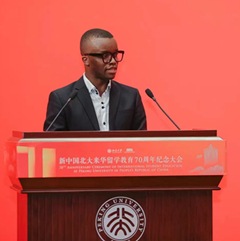
Joseph Olivier Mendo’o
A Cameroonian student at School of International Studies of Peking University and Head of Delegation of African Youth in China
Young people in China and Africa represent an important human resource within society since they act like agents of social change, economic development and progress. The African and Chinese youth are meant to play a more active role in not only renewing bilateral/multilateral friendship, but also intensifying cooperation between the two emerging international players.
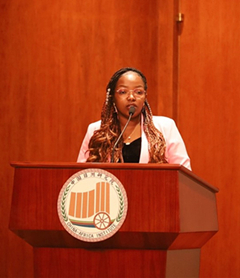
Lilian Wanjiru Njaramba
A Kenyan postgraduate student at the Center for West African Studies of the University of Electronic Science and Technology of China
As an African student from Kenya studying in China for the past seven years, I see myself as an ambassador of this friendship. I have been able to study in China thanks to a Chinese government scholarship. Upon completion of my studies, I plan to go back to my country to not only promote China, but also use what I have learned in China to contribute to the progress of my country.
Going forward, it is critical for us, the African youth, African students in China, Chinese youth and Chinese students, to build on the foundations laid by our forefathers and make the most of the opportunities available to us in order to create a better China and Africa for future generations.

George Solomon Njau
Tanzanian, Co-Founder of Chap Cargos, a logistics service provider focusing on shipping between China and Africa
As we all know, China-Africa friendship has a long history. In this century, youth have played a big part in boosting this friendship. Nowadays, young people are pushing business ties between the two sides. Many entrepreneurs are young people who are buying things from China and sending them to Africa, and vice versa. This two-way process has helped the development of China and Africa in general.
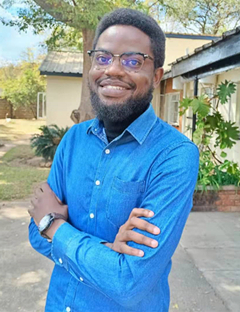
AbeL Hara
A Zambian medical student of Gannan Medical University
As a sixth-year medical student of Gannan Medical University, I have had ample opportunity to participate in various China-Africa youth exchanges, both under the auspices of my university and also through travel to culturally and historically relevant sites that have offered me the gift of being on the cutting edge of technological revolution and the beauty and heritage of preserved history and culture.
Armed with the opportunities that learning a new language provides, and the privilege of being in a university where we were encouraged to cultivate skills that were extracurricular but complimentary to our academic pursuits in the context of medical school, I couldn’t help but cultivate a very deep appreciation for China-Africa youth exchanges.

Hazem Samir
Deputy Editing Manager of Al-Gomhuria newspaper in Egypt
While conflicts and instability have become the world’s predominant feature in the current time, China-Africa ties are steadily scaling great heights in several spheres, amid the emergence of a new global order based on pluralism and integration.
I think education is one of the most important areas in which the two sides have cooperated during the last years. Education exchange helps African students build a better future not only for themselves, but also for their countries. Also, learning Chinese language serves the Africa-China relationship, and brings the two peoples together culturally and socially. Moreover, young Africans can take advantage of their study in China to learn more about this significant country economically, politically, technologically, and historically.
| About Us | Contact Us | Advertise with Us | Subscribe |
| Copyright Beijing Review All rights reserved 京ICP备08005356号-5 京公网安备110102005860号 |